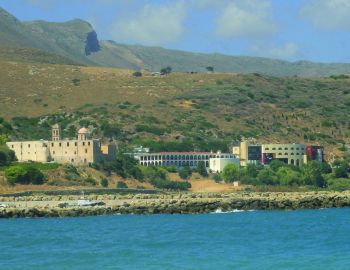The Central Committee of the World Council of Churches (WCC) met at the Orthodox Academy of Crete from 28 August to 5 September 2012. This committee is a decision-making body comprising a maximum of 150 members that represent the 345 member churches of the WCC. Previously the Central Committee met for discussions every 18 months, but this has now been extended to every two years. This year’s meeting on Crete was attended by 143 Central Committee members with voting rights, plus 150 additional participants (advisers, observers, representatives of ecumenical organisations, WCC staff, stewards and media representatives). Archbishop Dr. Joris Vercammen participated as a Central Committee member and the Revd. Ioan L. Jebelean from Lucerne as an adviser and representative of the Union of Utrecht. In particular the meeting focused on preparations for the tenth assembly of the World Council of Churches in Busan, South Korea, from 30 October to 8 November 2013. The assembly’s theme will be “God of life, lead us to justice and peace”. The planning committee’s report was adopted following discussions and minor adjustments.
The conference began with discussions of reports by Chairman Prof. Walter Altmann and Secretary-General Revd. Dr. Olav Fykse Tveit. Prof. Altmann’s report was titled “Signs of a way forward”. In the opening chapter he described in depth various documents of the Second Vatican Council and their importance for the ecumenical movement, and highlighted the Council’s significance for Christian unity. Chapter 2 outlined the position of the WCC and possible opinions on urgent issues such as wealth and poverty, environmental problems, globalization and arms trading. Altmann then expressed ideas and visions concerning the future of the WCC and ecumenism.
The report by the Revd. Dr. Olav Fykse Tveit was titled “God of life, lead us to justice and peace”. He spoke about the key tasks of the Crete meeting, the work conducted by the WCC since its ninth assembly, and the implications of this work for the tenth assembly in Busan. In addition he outlined the planned restructuring and reorganisation of the WCC and summarised its activities of the last few years. (Both full-length reports and all other documents from the meeting can be accessed at www.crete2012.org until the end of October 2012. Login name: visitor, password: Crete2012.)
Other important reports were presented and discussed in detail during the meeting. A report by the WCC’s Faith and Order Commission titled “The Church” was unanimously adopted. The Commission on World Mission and Evangelism presented a report titled “Together towards life: mission and evangelism in changing landscapes” that contained goals, visions and concepts for a new understanding of what mission and evangelism means today. A declaration of unity was discussed, slightly modified and accepted; it will be presented for adoption at the tenth assembly in Busan. The Central Committee of the WCC also expressed its position on various current issues including the financial and economic crisis in Greece and the political situation in Syria, Pakistan, Albania and Myanmar. Animated discussions took place on several social and political issues such as the North–South imbalance, gender questions, the integration of people with disabilities and young people into the World Council of Churches, and the gap between laypeople and clergy in the WCC.
 Ecumenical Patriarch Bartholomew I of Constantinople visited the meeting on the evening of Saturday, 3 September 2012. He gave an address that was open to the public and received with interest by a large number of listeners. In this address he looked ahead to the tenth assembly, emphasising the freedom of creation and the importance of this divine gift to humanity, and the responsibility that results from it. Regrettably there was no opportunity after the address for the participants to discuss their thoughts with the Ecumenical Patriarch in person.
Ecumenical Patriarch Bartholomew I of Constantinople visited the meeting on the evening of Saturday, 3 September 2012. He gave an address that was open to the public and received with interest by a large number of listeners. In this address he looked ahead to the tenth assembly, emphasising the freedom of creation and the importance of this divine gift to humanity, and the responsibility that results from it. Regrettably there was no opportunity after the address for the participants to discuss their thoughts with the Ecumenical Patriarch in person.
Despite the full conference programme, the participants also had time for spiritual reflection. Each day began with prayers and an hour of Bible study. Led by an Indian Orthodox priest and an American Protestant, the Bible study touched on current issues including the environment, power, peace and questions of gender. Evening prayers were accompanied by music from a variety of regions. I noticed, along with the Orthodox representatives, that God was never referred to as “Father, Son and Holy Spirit” during the evening prayers. It is regrettable that the Trinity is no longer mentioned at the beginning of prayers or in the final blessing at ecumenical meetings and events. Nevertheless, it remains extremely important for Old Catholic representatives to play an active part in the World Council of Churches. With our involvement and our contribution to the work of the WCC, we help to ensure that minorities and smaller church groups are not forgotten. Our work in the programme committee and the constructive comments of Archbishop Dr. Joris Vercammen during the plenary sessions were widely appreciated and gratefully received. It was also important to have the opportunity to strengthen our interpersonal relationships and share ideas with the representatives of other churches, denominations and institutions, including the Vatican, the Orthodox Church, the Anglican Church, the Lutheran Church, our sister church on the Philippines and the Mar Thoma Church.
Revd. Ioan L. Jebelean

